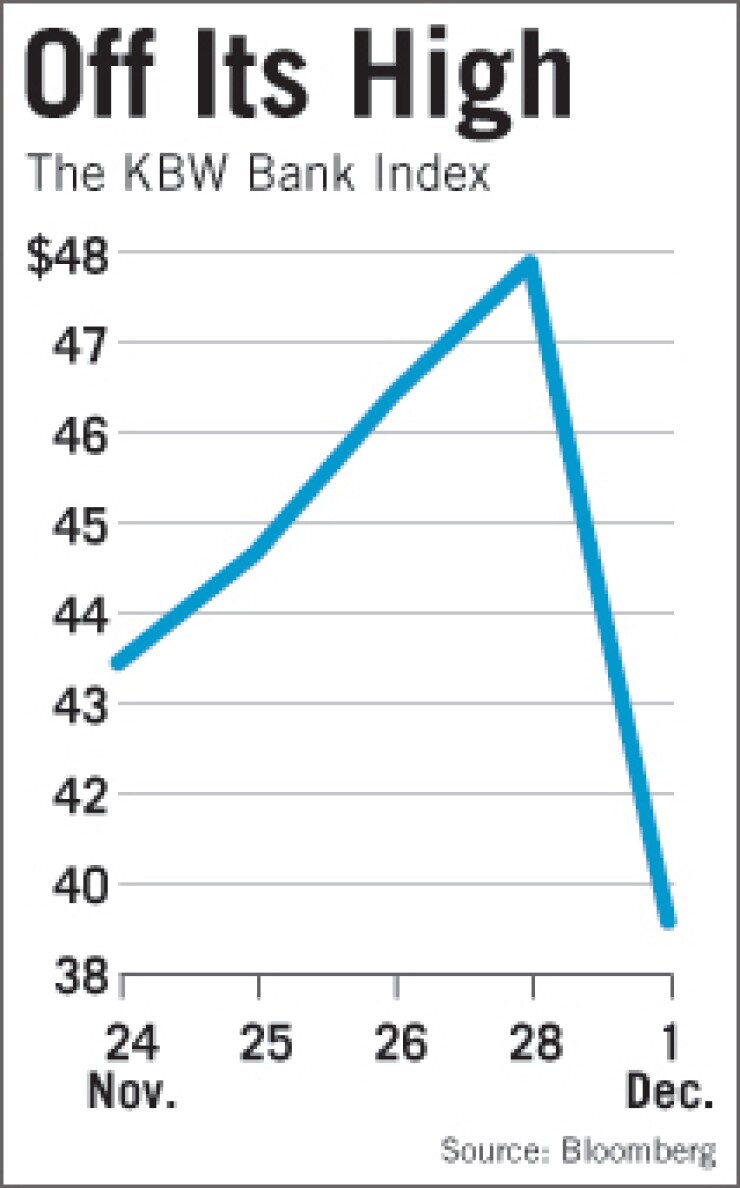
Bank stocks were severely punished Monday as investors took gains after a week of rallies and bad economic news flooded the market, heightening fears.
The KBW Bank Index sank 17.4%%, after rising 3.15% on Friday and closing up 29.7% last week. Monday's slide, which came as a report officially declared that the United States has been in recession since December 2007, was the first negative trading day for bank stocks after five consecutive days of rallies.
"Those were the strongest five days since the 1970s, and some people were just taking profits, or getting themselves ready for the end of the year, whether for tax purposes or fund redemptions," said Matthew Shields, a trader at FIG Partners LLC.
Frank Barkocy, the director of research at Mendon Capital Advisors, said that some large-cap banking companies whose stocks were buoyed last week suffered the sharpest pain Monday. Citigroup Inc., which rallied last week after securing a government bailout, sank 22.2%. Bank of America Corp. shed 20.9%, and Wells Fargo & Co. dropped 19%.
Investors remain concerned about persistent pressure on banks' asset quality, Mr. Barkocy said. However, he said, he had no knowledge that Monday's rout was stimulated by new concern about unanticipated bombshells on the balance sheets of the nation's banks.
"But I do think that investors are waiting for more definitive results from the various government programs that have been announced," most notably the Treasury Department's Capital Purchase Program, which was intended to kick-start lending, Mr. Barkocy said. "There may be some frustration that it's going to take some time for that to kick in, but that's to be expected."
In addition to the National Bureau of Economic Research's Business Cycle Dating Committee declaration of a recession that is nearly a year old, traders said, a slew of negative economic news reports fanned the flames. The committee based its conclusion on continuing declines in both the country's gross domestic product and employment rates.
Other reports out Monday included that of the Institute for Supply Management, whose index of manufacturing activity fell from 38.9 in October to 36.2 in November, its lowest reading since May 1982. Economists on average had expected an index reading of 38.4, according to Thomson Reuters. Readings under 50 indicate contraction in manufacturing.
The Commerce Department said that construction spending fell 1.2% in October. Estimates by analysts in a Thomson Reuters survey averaged a negative 0.9%.
The news sent the broader markets reeling. The Dow Jones industrial average fell 7.7% Monday after rising 9.7% last week. The Standard & Poor's 500 index fell 8.9%, after rising 12% the week before.
Gary Townsend, the chief executive of Hill-Townsend Capital LLC, said that the market continues to search for a bottom. "Hopefully financials will play a very strong part in the recovery when we finally see it in the coming months," he said.
JPMorgan Chase & Co. fell 17.5%, and American Express Co. was off 15.7% after Meredith Whitney of Oppenheimer & Co. wrote in a research report Monday that credit card companies would probably cut more than $2 trillion of consumer lending during the next 18 months. Goldman Sachs Group Inc. declined 16.8%, and Morgan Stanley fell 23.1% after several analysts cut fourth-quarter and full-year estimates.
There were some gainers. Southern Community Financial Corp. in Winston-Salem, N.C. rose 11.4% and Great Florida Bank in Coral Gables, 6.7%.





